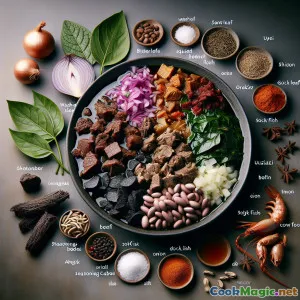
Semur Nigeria Penuh Jiwa dengan Ayam dan Paprika
(Soulful Nigerian Stew with Chicken and Peppers)
(0 Ulasan)0
1,742
Juli 24, 2025
Laporkan Masalah
Bahan
-
800 grams Paha ayam, ber tulang, tanpa kulit
(Cut into pieces)
-
6 medium Tomat Roma
(Cincang)
-
2 large Paprika merah
(Seeds removed, chopped)
-
2 small Cabe Merah Scotch Bonnet
(Deseeded for milder spice)
-
2 medium Bawang bombay kuning
(One blended, one sliced)
-
4 large Siung bawang putih
(Cincang)
-
1 tbsp Jahe segar
(Parut)
-
80 ml Minyak nabati
(Palm oil or sunflower works)
-
2 tbsp Pasta tomat
(For color and depth)
-
250 ml Kaldu Ayam
(Homemade or low-sodium)
-
1 tsp Thyme
(Kering)
-
1 whole Daun salam
(Removable)
-
1 tsp Bubuk kari
(West African style pref)
-
1 tsp Garam
(Sesuai selera)
-
0.5 tsp Lada hitam giling
-
1 cube Kock kaldu
(Optional flavor boost)
-
2 tbsp Daun peterseli atau ketumbar segar
(Cincang, untuk hiasan)
(Cut into pieces)
(Cincang)
(Seeds removed, chopped)
(Deseeded for milder spice)
(One blended, one sliced)
(Cincang)
(Parut)
(Palm oil or sunflower works)
(For color and depth)
(Homemade or low-sodium)
(Kering)
(Removable)
(West African style pref)
(Sesuai selera)
(Optional flavor boost)
(Cincang, untuk hiasan)
Nutrisi
- Porsi: 4
- Ukuran Porsi: 1 mangkuk (300g)
- Calories: 412 kcal
- Carbohydrates: 0 g
- Protein: 24 g
- Fat: 26 g
- Fiber: 5 g
- Sugar: 8 g
- Sodium: 690 mg
- Cholesterol: 118 mg
- Calcium: 55 mg
- Iron: 3.2 mg
Instruksi
-
1 - Prepare the Vegetable Base:
Blend the chopped tomatoes, red bell peppers, Scotch bonnet, and one onion with a splash of water until smooth. Set aside the blended mix.
-
2 - Brown the Chicken:
Season chicken with salt, black pepper, and a pinch of thyme. Brown in hot oil in a heavy-based pot for 8-10 minutes. Remove and set aside.
-
3 - Fry the Onions and Paste:
Discard excess oil leaving about 3 tbsp. Add sliced onion, fry until fragrant, then stir in the minced garlic and ginger. Add tomato paste and stir well for 2-3 min.
-
4 - Cook the Sauce:
Pour the blended pepper-tomato mix into the pot. Cover and simmer, stirring frequently, for 12-15 minutes until reduced and fragrant; oil should start to rise to the top.
-
5 - Add Chicken and Seasonings:
Add back the seared chicken, pour in chicken stock. Stir in thyme, bay leaf, curry powder, bouillon cube, more salt if needed. Mix thoroughly.
-
6 - Low Simmer for Flavor:
Reduce heat, cover, and simmer for 18-20 min until chicken is fully cooked, tender, and stew thickens.
-
7 - Finish and Serve:
Check for seasoning. Ladle stew into bowls and garnish with chopped fresh herbs. Serve hot with steamed rice, yam, plantains, or bread.
Blend the chopped tomatoes, red bell peppers, Scotch bonnet, and one onion with a splash of water until smooth. Set aside the blended mix.
Season chicken with salt, black pepper, and a pinch of thyme. Brown in hot oil in a heavy-based pot for 8-10 minutes. Remove and set aside.
Discard excess oil leaving about 3 tbsp. Add sliced onion, fry until fragrant, then stir in the minced garlic and ginger. Add tomato paste and stir well for 2-3 min.
Pour the blended pepper-tomato mix into the pot. Cover and simmer, stirring frequently, for 12-15 minutes until reduced and fragrant; oil should start to rise to the top.
Add back the seared chicken, pour in chicken stock. Stir in thyme, bay leaf, curry powder, bouillon cube, more salt if needed. Mix thoroughly.
Reduce heat, cover, and simmer for 18-20 min until chicken is fully cooked, tender, and stew thickens.
Check for seasoning. Ladle stew into bowls and garnish with chopped fresh herbs. Serve hot with steamed rice, yam, plantains, or bread.
Informasi Lebih Lanjut: Semur Nigeria Penuh Jiwa dengan Ayam dan Paprika
Nigerian Stew: A Hearty, Celebratory Classic
Nigerian stew is an ode to West African hospitality, with its depth of flavor and iconic vibrant red hue. Found at celebrations, family gatherings, and regular weekday meals, this stew sits at the heart of Yoruba, Igbo, and Hausa delis alike. Its single defining feature is the rich base of tomatoes and peppers—all enlivened with distinctive African spices, optional Scotch bonnets for fierce heat, and succulent pieces of chicken that soak up flavor like sponges.
History & Cultural Significance
The origins of Nigerian stew trace back centuries, linking together ingredients found across West Africa. Tomatoes and peppers, native to the Mediterranean and native to South and Central America, were introduced to West Africa during the Columbian Exchange and have been emphatically embraced. Palm oil (or vegetable oil, as a modern substitute), combined with onions and hot chilies, makes a flavor foundation distinct in the region’s cuisine.
In Nigeria, stews aren’t limited to one style—variations abound depending on tribe, personal taste, and available produce. However, tomato-based stews reign, often served over rice, boiled yams, sweet potatoes, tangled among plantain, folded into pasta, or just scooped up with age-old bread. Sundays, special occasions, and everyday dinners alike all celebrate this dish.
Nigerian stew reflects ingenious budgeting, as the cooking process allows tougher pieces of chicken or goat to become exquisitely tender. Large-batch cooking also means a family can eat from one pot for days—with flavors improving as it rests.
Unique Aspects & Personal Notes
This version leans into pure chicken flavor and spiciness, but the base is remarkably flexible:
- Spice control: Use Scotch bonnets for authentic fiery heat, but remove seeds or use fewer for milder palates.
- For a luxurious, deeply layered taste, try splitting the oil: half palm (deep red hue, earthy aroma) and half a neutral vegetable oil to soften the robust notes.
- Vegetarian? Swap chicken to eggplant cubes or meaty mushrooms, keep the rest of the process.
- Add-ins like boiled eggs, beef, goat, or fish are always welcome. Often, shops sell 'assorted' stew—a magical blend with something for everyone.
Nigerians take cooking seriously; stews are tested, revised, and lovingly tasted by many family hands before they're 'ready.' Serve yours with long-grain rice, pounded yam, humble garri, thick slices of bread—each bite a comforting reminder of West African warmth.
Tips & Serving Suggestions
- Simmer low and slow. Stew doesn’t rush; if the oil starts to rise over your sauce, you’ve done it right.
- Taste, adjust, taste again: peppers vary in spice, tomatoes in sweetness.
- Tip for beginners: Don’t let additions of garlic, ginger, or spices overpower the dish—aim for depth and balance.
Leftovers are arguably better, as flavors bloom overnight. Store tightly covered in the fridge and reheat gently; enjoy as a main or on top of anything carb-rich for a proper Nigerian feast.
Final Word
With each forkful or spooned bite, Nigerian stew offers a taste of history, comfort, and celebration—no matter where in the world you live. Let this recipe guide you through shimmering deep red oil, fragrant steam, and, most importantly, bring with it the joy that has shaped Nigerian tables for generations.























